Thousands of people jostled and begged for seats Wednesday on scarce flights out of a Philippine city demolished by a super typhoon, as authorities struggled to dispose of bodies and anger at the slow arrival of aid turned deadly.
Corpses putrefying in the humid heat compounded a growing health menace, after one of the strongest storms on record left thousands dead. But authorities were forced to call off one mass burial in the ruined city of Tacloban when gunshots were fired.
"We had finished digging the mass burial site. We had the truck loaded with bodies...but...there was some shooting....they could not proceed," Tacloban mayor Alfred Romualdez told AFP.
Adding to the grim body count, news emerged that eight people were crushed to death Tuesday when a huge crowd of survivors from Super Typhoon Haiyan rushed a government rice store.
"One wall of our warehouses collapsed and eight people were crushed and killed instantly," the National Food Authority's Rex Estoperez said of the incident in Alangalang town, 17 kilometres (10 miles) from Tacloban.
Five days after Haiyan ripped apart entire coastal communities, the situation in Leyte's provincial capital Tacloban was becoming ever more dire with essential supplies low and increasingly desperate survivors clamouring to leave.
"Everyone is panicking," Captain Emily Chang, a navy doctor, told AFP.
"They say there is no food, no water. They want to get of here," she added, saying doctors at the airport had run out of medicine, including antibiotics.
"We are examining everyone but there's little we can do until more medical supplies arrive."
The World Health Organization said there were significant injuries that needed to be dealt with, even as health professionals worked to prevent outbreaks of diseases caused by cramped living conditions and dirty drinking water.
It cautioned regular health needs also needed to be met, including the 12,000 babies expected to be born in the disaster zone this month.
The United Nations estimates 10,000 people may have died in Tacloban where five-metre (16-foot) waves flattened nearly everything in their path as they swept hundreds of metres across the low-lying land.
However, Philippine President Benigno Aquino said late Tuesday he believed that toll was "too much", adding that 2,500 "is the figure we're working on", despite the rapidly climbing toll and the bodies still littering the streets of Tacloban.
Cabinet Secretary Rene Almendras admitted authorities had been overwhelmed by the sheer number of corpses.
"The reason the body recovery stopped is because we ran out of body bags," he said. "But we now have 4,000 bags. I am not saying the casualties are 4,000. We are making sure there is an oversupply."
'Where is the food?, where is the water?'
'We made it out, but now we may die from hunger'
At Tacloban airport, AFP journalists witnessed exhausted and famished survivors pushing and shoving each other to get on one of the few flights out of the city.
Philippines Airlines said it was laying on six a day, each with 75 seats.
"We have been here for three days and we still cannot get to fly out," said a frail Angeline Conchas, who was waiting for space on a plane with her seven-year-old daughter Rogiel Ann.
Her family were trapped on the second floor of their building as flood waters rose around them.
"We made it out, but now we may die from hunger."
The UN estimates more than 11.3 million people have been affected with 673,000 made homeless, since Haiyan smashed into the nation's central islands on Friday.
Overwhelmed and under-resourced rescue workers have been unable to provide food, water, medicines, shelter and other relief supplies to many survivors, and desperation has been building across the disaster zones.
The international relief effort is building momentum with many countries pledging help. The United States and Britain are sending warships carrying thousands of sailors to the Philippines, and US amphibious craft were also being deployed.
All were expected to arrive over the next few days. But for a shattered population already in dire straits, any delay is too long.
"People are desperate because they have nothing in Tacloban," Marco Boasso of the International Organization for Migration said.
Hundreds of soldiers and police were patrolling the streets and manning checkpoints in Tacloban to try to prevent pillaging and the government said roads were now passable throughout the area, raising hope that relief might finally reach those in need.
"All the roads and bridges except two bridges in Region 8 are already passable," said National Disaster Risk Reduction Management Council chief Eduardo del Rosario. Region 8 includes Leyte and Samar, the two worst-hit provinces.
"All our necessary relief goods, they can go to Tacloban (by road)."
'It will be days, if not weeks, before we have a clear picture'
President Aquino has declared a "state of national calamity", allowing the government to impose price controls and quickly release emergency funds.
Aquino's figure of up to 2,500 deaths looked set to be easily surpassed. By early afternoon Wednesday the government said 2,275 people were known to have died and 80 were still missing.
International aid groups said they feared what was known now was just the tip of the iceberg.
"Obviously the situation in Tacloban is appalling but we are also very concerned about outlying islands," Patrick Fuller, Red Cross spokesman in the Asia-Pacific, told AFP.
"There are a lot of them and I think it will be days, if not weeks, before we have a clear picture.
"No one is in a position to give an accurate figure. In Tacloban bodies are lying by the side of roads but those are just the ones that are visible. If you look around at the amount of wreckage caused you can see that people might have been taken out by a tidal surge."
"It's too early but (the death toll) will definitely be in the thousands."






















































